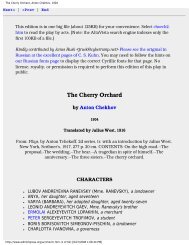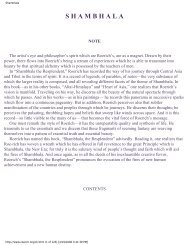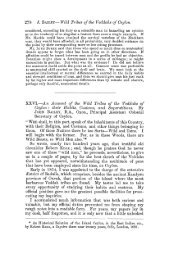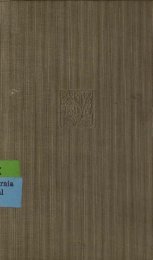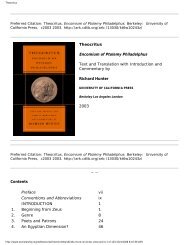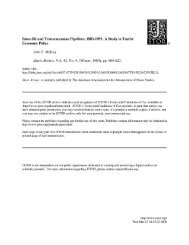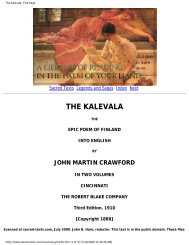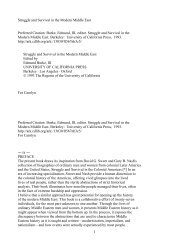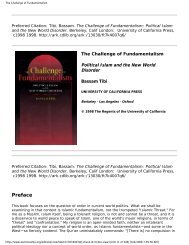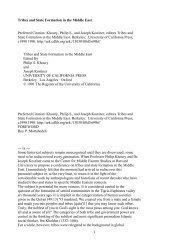Between Two Worlds Kafadar.pdf
Between Two Worlds Kafadar.pdf
Between Two Worlds Kafadar.pdf
You also want an ePaper? Increase the reach of your titles
YUMPU automatically turns print PDFs into web optimized ePapers that Google loves.
existence.[2]<br />
The only pieces of writing that survive from the days of Osman are not on paper<br />
but on coins.[3] There is not much that one can infer from their terse formulae<br />
about the ideology of the early Ottomans. As insignificant as his polity may<br />
have been, Osman had obviously found the moment opportune to make the<br />
significant political statement of sovereignty that is implied in the striking<br />
of coins in one's own name. These findings should also put to rest the disbelief<br />
in Ertogril as a real historical character since he is, at least on one of the<br />
coins, referred to as Osman's father. Otherwise, but for the fact that they were<br />
issued by a Muslim ruler, they do not reveal much about the political culture of<br />
the little beglik.<br />
― 61 ―<br />
Yet we certainly do not need to wait until the time- and scholarship-worn<br />
inscription of 1337 for some glimpses into the self-image of the early Ottomans.<br />
A revealing piece of evidence on early Ottoman political culture is an endowment<br />
deed from 1324.[4] <strong>Two</strong> aspects of this document indicate that already by this<br />
early date, the budding beglik had been touched by the so-called higher Islamic,<br />
or Persianate, ruling traditions. The deed is composed in Persian, and the first<br />
appointee as the administrator of the endowment is identified as a manumitted<br />
eunuch of Orhan's . Yet the true value of the document in this consideration of<br />
the history of notions concerning "war for the faith" lies in the fact that<br />
Orhan , in whose name the deed is issued, and his recently deceased father,<br />
Osman, are both mentioned with their epithets: Suca`uddin and Fahruddin ,<br />
respectively ("Champion of the Faith" and "Glory of the Faith"). These epithets<br />
prove well beyond doubt that the Ottomans had adopted Islamic nomenclature<br />
compatible with the rest of Anatolian Muslim society more than a decade before<br />
the Bursa inscription. It is also impossible that Orhan would not be aware of<br />
the meaning of Suca`uddin when his entourage included people who could produce a<br />
canonically impeccable endowment deed in Persian.<br />
In this world of dizzying physical mobility — crisscrossed by overlapping<br />
networks of nomads and seminomads, raiders, volunteers on thee way to join<br />
military adventurers, slaves of various backgrounds, wandering dervishes, monks<br />
and churchmen trying to keep in touch with their flock, displaced peasants and<br />
townspeople seeking refuge, disquieted souls seeking cure and consolation at<br />
sacred sites, Muslim schoolmen seeking patronage, and the inevitable risk-driven<br />
merchants of late medieval Eurasia — it is not at all surprising that<br />
information traveled. So did lore and ideas, fashions and codes, of course. The<br />
title that Orhan had adopted, "the champion of the faith," was a highly popular<br />
one in western Anatolia among other begs of his generation; the Ottomans<br />
obviously were up-to-date on the frontier vogue.[5] It is simply impossible to<br />
consider that they would have been unaware of or untouched by cultural elements<br />
that the whole region was heavily immersed in. In fact, communication between<br />
the proto-Ottomans and their not-so-immediate neighbors can be established in<br />
the very earliest datable record of Osman's activities. Pachymeres (d. ca.<br />
1310), the Byzantine chronicler, writes that Osman was joined by warriors from<br />
the Meander region, in addition to some from relatively nearby Paphlagonia, in<br />
57



